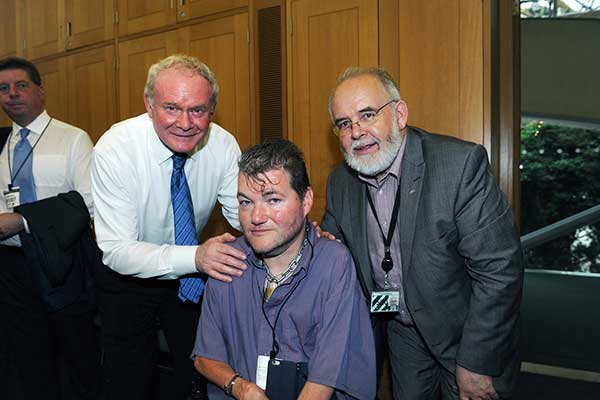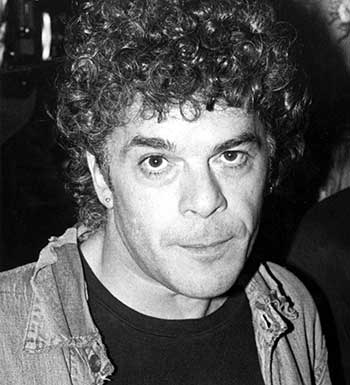JOHN KELLY is an actor, singer and activist for disability rights. His mother is from Athea, Co. Limerick and his father from Knocknasna, Abbeyfeale and he is proud of his heritage — even his band Rockinpaddy leaves you in no doubt about his Irish roots.
Until recently John worked as a youth worker and had fairly regular gigs as a musician. He had the chance to travel the world and perform with musicians including Herbie Flowers and Linda Gale Lewis (Jerry Lewis’s sister). Life was, in his words, “pretty much OK.”
However, John’s life changed forever when he got a call asking him to be involved with the development of Reasons to be Cheerful, a play loosely worked around Ian Dury’s earlier songs. John was a big Ian Dury fan (another performer with strong Irish roots) so thought, “Wow! singing Ian Dury songs — who wouldn’t want that?”
He worked with Graeae Theatre Company developing the show and got involved with some rehearsals. “I thought, ‘Well, I have lived the dream and helped develop vocals for a show by a world-renowned theatre company and sang Ian Dury numbers — and I got well paid. Happy days.”
A few days later he got a call asking if he would consider taking a major role in the play and going on a national tour with Graeae. Since then, John has not looked back. He toured with the production, sang Spasticus Autisticus from the play at the opening ceremony of the 2012 Para Olympics and, perhaps best of all, he has met and performed with The Blockheads.
Much of John’s early life was spent in hospital due to a rare impairment that has made him a full time wheelchair user. Music was always part of his life.
He says, “Music is a really significant part of Irish culture and perhaps our biggest export. Irish people are steeped in music. It is in our blood. It was everywhere when I was growing up. My parents were always singing or playing records. They liked Irish traditional music, country and western, and rock and roll — so there was always Johnny Cash, Big Tom, the Dubliners, the Clancy Brothers, Wolfe Tones and country classics.”
John went to a school for disabled people and there his teacher encouraged him to sing and play the piano. Neither John or his parents saw his disability as a barrier. From the age of eight he began performing, debuting with the self-penned Seaweed Song (about how you could tell what the weather was going to be like when you touched seaweed).
He loved the reaction he got when he sang and performed in school concerts and whenever he could.
As soon as he was old enough John began performing in pubs. “In Ireland” he says, “people always sang in pubs. He loved it when conversation would stop and he could hear people saying,‘shh, shh…listen”
John’s musical influences came from various sources. “I developed a liking for edgy material including ska, British metal — short, high energy tracks; Elvis, rockabilly, rock and roll, punk and reggae. The groove and message of reggae’s peace, love and understanding, along with a message for change and freedom had links I feel with some Irish songs, and now with the songs I sing about disability stuff. Ian Dury was someone I admired, and although he was not really a role model for me at first, he became a huge one later on when I learnt he was a disabled person too. I bought this album called Midnight Hustle full of rubbishy pop songs — except for What a Waste By Ian Dury and The Blockheads. I pretty much wore out the bit of the vinyl where I continuously replaced the stylus on its playing position.”
John’s first band was called WAC (We Are Cripples). “We were absolute rubbish! We had only a snare drum and a high hat — the rest of the stuff we made as our school had few instruments. They probably thought us crips wouldn’t be in proper bands, only good for happy flappy tambourine stuff. How wrong could they be? I held a guitar on my lap and we just made a load of noise, basically.”
John’s later band ADR (Another Dead Rabbit) — named after a road trip to a gig in the New Forest — were close to getting a record deal, but when that fell through John was invited to play gigs in Memphis and Nashville.
 Martin McGuinness MLA and Sinn Fein Francie Molloy MP pictured with John Kelly from the Independent Living Fund campaign.(Picture: Malcolm McNally)
Martin McGuinness MLA and Sinn Fein Francie Molloy MP pictured with John Kelly from the Independent Living Fund campaign.(Picture: Malcolm McNally)By the time he got the call from Graeae he was ready for a new challenge but it took him a while to believe his luck.“It was not until I got to Stratford East to open the show after three months of rehearsals I realised this was really happening. I always thought I would stand in until they got a proper singer/actor in. I never seriously thought it was going to be me.”
Kelly got a vocal coach, because the producers had concerns about his stamina. He says, “It turns out my impairment works on my side, because I don’t sing in the usual way — diaphragm and all that. I had to work at it and this created the sound they wanted. My coach taught me how to breathe properly, getting enough oxygen to keep going. For two and a half months, we toured and the voice somehow kept going. On that tour, I learned more skills — like how to be interviewed, stamina, creating the right conditions to perform my best. I watched an interview with Ian and realised we had more in common with having to work at the vocals. He got the same aches and pains I got when you perform right.”
Ian Dury became more than just a role model; he was almost a guide. Jenny Sealey, artistic director of Graeae, has also been a huge influence. “Jenny gave me that discipline to listen and find the moment to make it happen,” he says. After Reasons, John stayed with Graeae as part of the team for a production of Weill’s Threepenny Opera.
John finds performing, whether on stage or at a gig, is emotionally powerful. He says, “ I feel both confident and nervous which are contradictory.” he says. “At a gig when you hear people singing your songs afterwards, it’s like being given your best birthday present. Sometimes, I get, ‘what’s that bloke in a wheelchair doing there?’ but not often. I know loads of talented disabled people and, in the music world, they still need to be making an impact. Being a musician is very important.”
As to the future John wants to improve, to do gigs that people enjoy, to write better material. He wants to continue to do pubs and clubs — and, whatever the situation, he will give the best he can so audiences enjoy it. He is working on a new music project called Songs that Changed our Lives, focusing on music that has become a catalyst for social change or, more generally, which are a marker in our life’s journey.
“I am excited about that” he says. “I am politically involved with the UK Disability Movement and the Independent Living movement.
I have been doing a lot of work there. We recently won a high court case against the UK government about their decision-making processes, and go back to court in the next few months to fight to save The Independent Living Fund which enables the most severely disabled people to live independent lives, a basic human right. I’d rather not have to fight for these things, but we aren’t giving up, although these are worrying times for me as it threatens my ability to work and tour. We used a lot of energy with the first win, but we will not go away. With the support of other artists, musicians and supporters we will summon energy to keep up the fight, because it is just and for the benefit of more, not the few.”
Regarding disability issues Kelly adds: “The idea of ‘I want to see the person and not the disability first’ is rubbish, as they are all part of the same person. I don’t hide the fact I am a disabled person because of how people react or respond to my impairment. I feel being a disabled person has enriched and given me a different view on life, but it is not only that which defines me — even if it’s what people might think is the problem, they are just wrong. It’s steps and stairs, and stares and attitudes that are the real barriers. Just as important to who I am is my background, culture, family, going to a segregated school, experiencing being different, going to university and realising I had the same insecurities and nervousness as everyone else had.”
Disabled people are resilient, creative and strong, despite often being the most disempowered in our society. It’s totally not the stereotype about being ‘brave and courageous’ but about being creative, risky, subversive, cool, edgy, adventurous and… just a little bit naughty. I think there is a really important link between theatre/performance and political/social change, which whilst we still have inequality and segregated systems then any activity which brings disabled and non-disabled people together, in my opinion is (sometimes in a small unstated way, sometimes in yer face way) about principles of social/political change.”
Finally John adds with a twinkle in his eye, “Want to now a little secret? I’ve always wanted an article in The Irish Post as I have boyhood memories of Mum and Dad planning the weekend dances at the Galtymore and Hibernian advertised in there.”


